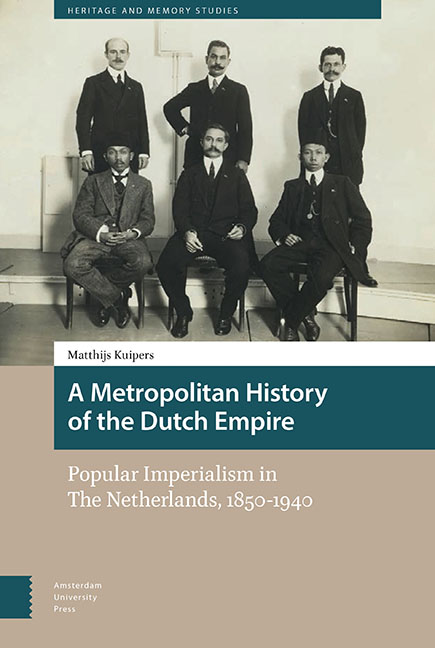Book contents
- Frontmatter
- Contents
- List of Figures and Tables
- List of Abbreviations
- On Names and Terminology
- Introduction: The Still Waters of Empire Run Deep
- 1 Food and Indifference: A Cultural History of the Rijsttafel in the Netherlands
- 2 Indonesians and Cultural Citizenship: The Metropolitan Microcosm of Empire
- 3 Schools and Propaganda: History Books and Schools as Sites of Imperial Campaigns
- 4 Scouting and the Racialized Other: Imperial Tropes in the Dutch Scouting Movement
- 5 Missionary Organizations and the Metropolitan Public: The ‘Inner Mission’ and the Invention of Mission Festivals
- Conclusion: A Fragmented Empire
- Sources
- Index
Conclusion: A Fragmented Empire
Published online by Cambridge University Press: 06 May 2022
- Frontmatter
- Contents
- List of Figures and Tables
- List of Abbreviations
- On Names and Terminology
- Introduction: The Still Waters of Empire Run Deep
- 1 Food and Indifference: A Cultural History of the Rijsttafel in the Netherlands
- 2 Indonesians and Cultural Citizenship: The Metropolitan Microcosm of Empire
- 3 Schools and Propaganda: History Books and Schools as Sites of Imperial Campaigns
- 4 Scouting and the Racialized Other: Imperial Tropes in the Dutch Scouting Movement
- 5 Missionary Organizations and the Metropolitan Public: The ‘Inner Mission’ and the Invention of Mission Festivals
- Conclusion: A Fragmented Empire
- Sources
- Index
Summary
Abstract
Dutch imperial culture is best approached as fragmented. The idea of fragmented imperialism allows us to see the diverse instances of popular imperial culture around the turn of the twentieth century, located in various places within civil society at large, sometimes in contestation with each other, but more often in wilful mutual ignorance of each other. They are all linked to the imperial project in their own ways, without one dominant form of imperial consciousness arising. This ambiguity itself, however, is a defining feature of public imperialism in the Netherlands, which predominantly revolved around the idea of a deeply entrenched separation between nation and empire. Some have argued that a ready vocabulary has been missing since decolonization to discuss the history of empire, particularly in the societies of former imperial powers like the Netherlands. This may be true, except that it ignores a continuity with earlier, colonial times, when a dominant, coherent set of imperial mentalities was already just as absent.
Keywords: decolonization, imperial culture, popular imperialism
The subject of this study has been the Dutch public consciousness vis-à-vis the Dutch colonial empire during the time of modern imperialism, roughly spanning the latter half of the nineteenth century and the first half of the twentieth century. This collective mentality is usually referred to with the term public imperialism, and its relevance as an object of study was established by British historians who held the assumption that, in order to administratively maintain the British Empire, a large pool of imperially minded citizens was needed from which to draw the workforce needed to do so. Scaling down both the colonizing nation and the empire in question, the case of the Netherlands provides a similar problematique, bringing to the fore the questions how this conquering of the metropolitan mind worked, how ‘steeped in empire’ Dutch society was, and what the limits of this cultural permeation were. But, as valid as these questions are, they also assume a monolithic public consciousness and provide a restraining binary logic of successful permeation or the lack thereof. In order to address these shortcomings, and in an attempt to render visible public ignorance and indifference to empire, I have approached Dutch imperial culture as fragmented by investigating other shades of empire-mindedness, such as anti-colonialism, and hitherto left-out narratives of Indonesians in the metropole.
- Type
- Chapter
- Information
- A Metropolitan History of the Dutch EmpirePopular Imperialism in the Netherlands, 1850-1940, pp. 211 - 218Publisher: Amsterdam University PressPrint publication year: 2022



